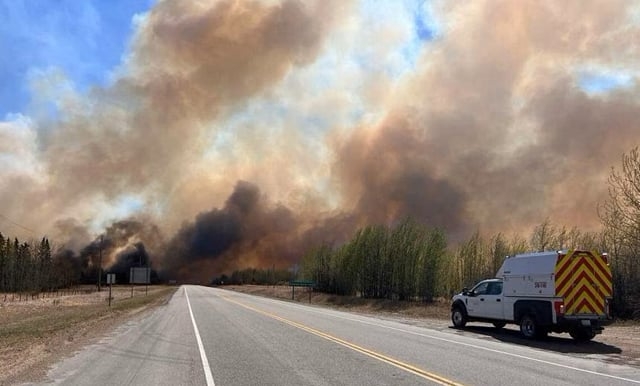Protecting UK's Rarest Wildlife: The Urgent Fight Against Wildfires

Table of Contents
The Devastating Impact of Wildfires on UK Habitats
Wildfires inflict catastrophic damage on UK habitats, destroying vital ecosystems that support a rich tapestry of plant and animal life. The intense heat destroys vegetation, leaving behind barren landscapes unsuitable for many species. Wildfire damage extends beyond immediate burning; the long-term effects on soil health and water quality can cripple an ecosystem's ability to recover.
Several UK habitats are particularly vulnerable:
- Peatlands: These carbon-rich wetlands are easily ignited and burn fiercely, releasing significant amounts of greenhouse gases and destroying unique plant communities.
- Heathlands: Characterized by low-lying shrubs and grasses, heathlands are prone to rapid fire spread, impacting rare reptiles and birds.
- Woodlands: Wildfires can decimate ancient woodlands, killing mature trees and disrupting the delicate balance of the forest ecosystem.
The impact on endangered species is severe. Habitat loss directly threatens the survival of many, including:
- Nightjar: This elusive bird relies on heathland for nesting and foraging.
- Dartford Warbler: Another heathland specialist, vulnerable to habitat destruction.
- Adders: These venomous snakes depend on specific microhabitats within heathlands and woodlands.
This devastating loss of UK biodiversity necessitates urgent action to protect these vulnerable species and their habitats.
Understanding the Causes of Wildfires in the UK
Wildfires in the UK are caused by a combination of factors, with human activity playing a significant role. The main causes include:
- Arson: Deliberately set fires are a leading cause of wildfires, often with devastating consequences.
- Discarded cigarettes: Negligently discarded cigarettes can easily ignite dry vegetation, particularly during hot and windy conditions.
- Lightning strikes: While less frequent, lightning strikes can ignite wildfires, especially in remote areas.
- Uncontrolled barbeques: Improperly extinguished barbeques are a significant fire risk, particularly in dry, grassy areas.
The influence of climate change is undeniable. Rising temperatures, prolonged droughts, and more frequent heatwaves create ideal conditions for wildfires to start and spread rapidly, increasing UK wildfire risk exponentially.
Preventative measures are crucial:
- Promoting responsible campfire practices and safe barbeque use.
- Implementing effective public awareness campaigns to educate the public about fire safety.
- Investing in improved fire detection systems and rapid response capabilities.
Conservation Efforts and Protecting Vulnerable Species
Various wildlife conservation UK initiatives are underway to combat the impact of wildfires. These efforts include:
- Habitat restoration: Rehabilitating fire-damaged areas by replanting native vegetation and restoring soil health.
- Species reintroduction programmes: Reintroducing endangered species into restored habitats.
- Firebreaks: Creating firebreaks to prevent the spread of wildfires by clearing vegetation along strategic lines.
Conservation charities, such as the RSPB and the Wildlife Trusts, play a vital role, working alongside government agencies like Natural England, to implement these strategies. Innovative approaches such as controlled burns, when carefully managed, can help reduce fuel loads and prevent larger, more destructive wildfires.
Examples of successful projects include:
- The restoration of heathland habitats on Salisbury Plain.
- Reintroduction programs for the Dartford warbler in specific regions.
The Role of Public Awareness and Community Action
Public awareness is paramount in preventing wildfires. Public awareness campaigns can educate the public on the risks, responsible behaviours, and the importance of reporting suspicious activity. Community involvement is equally vital; community action groups can play a significant role in wildfire prevention and response.
Individuals can contribute through:
- Reporting any suspicious activity to the authorities immediately.
- Practicing responsible land management, such as clearing dry vegetation around homes.
- Adhering strictly to fire safety regulations when engaging in outdoor activities.
Protecting UK's Rarest Wildlife – A Call to Action
Wildfires pose a significant and escalating threat to UK biodiversity, causing widespread habitat loss and endangering numerous endangered species UK. Proactive measures are crucial to protect vulnerable species and habitats. Protecting UK's rarest wildlife is a collective responsibility. We must all work together to reduce the risk of wildfires and mitigate their devastating effects.
Learn more about wildfire prevention and support conservation charities working to protect our precious wildlife. Engage in responsible land management practices and report any suspicious activity. By working together, we can ensure a future where UK wildlife thrives, free from the devastating threat of wildfires. For further information and resources, please visit [link to relevant government website] and [link to relevant conservation charity website].

Featured Posts
-
 Reinstated Trump Tariffs Navigating The Challenges For Europe
May 13, 2025
Reinstated Trump Tariffs Navigating The Challenges For Europe
May 13, 2025 -
 Okc Thunders Draft Position Uncertain Future Following Seasons End
May 13, 2025
Okc Thunders Draft Position Uncertain Future Following Seasons End
May 13, 2025 -
 Romski Muzikanti V Prekmurju Zakaj Muzikant In Ne Glasbenik
May 13, 2025
Romski Muzikanti V Prekmurju Zakaj Muzikant In Ne Glasbenik
May 13, 2025 -
 Townhouse Hit By Three Separate Car Crashes In Two Years Cnn
May 13, 2025
Townhouse Hit By Three Separate Car Crashes In Two Years Cnn
May 13, 2025 -
 Netflix Adds Forgotten Scarlett Johansson And Chris Evans Film
May 13, 2025
Netflix Adds Forgotten Scarlett Johansson And Chris Evans Film
May 13, 2025
